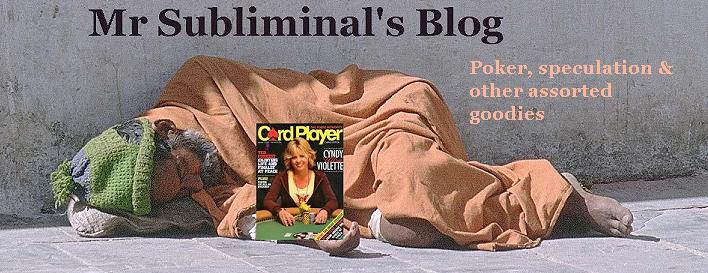Thanks to TripJax for his cogent comments. The next step is to set up a model and run some simulations, so that we can dispel this myth forever. The model is simplistic and does not take into account increasing blind structures, chip stacks or any other idiosyncrasies of a tournament. Nevertheless, I believe the results are just as valid.
I used the following assumptions :
1. For each hand on each table there is a 0.001 probability that one player will be eliminated.
2. There are 10 players per table and the tables are kept as equal as possible.
3. Play is hand for hand.
4. As per WSOP practice, 10% of the field gets paid.
5. Play is halted when the bubble is eliminated.
The results are that the expected number of hands played till the bubble is eliminated is independent of the size of the field. So cashing in a WSOP event is just as impressive if the field is 800 or 8,000. As for winning the bracelet, now that's a different story.
Friday, June 15, 2007
The Myth of the Huge Field - Part II
Posted by
Mr Subliminal
at
5:59 PM
![]()
Subscribe to:
Post Comments (Atom)




7 comments:
you abolutely 200% just blew my mind. wtf? did you just write about? good lord i'm drunk...
this is tripjax and i've been taken captive...
...........help!!!!!
man i'm tarded. i don't even remember writing the above comment. sorry, dude.
good post by the way...
Thanks and definitely no need to be sorry.
I saw your Waffles vs Chad ROI comment. Is there an explanation for the math that even a former social sciences major can understand??
lightning, see my post.
Your reasoning seems logical, given your stated assumptions. It appears that the determining factor in how many hands will play is the probability of a player busting out on any given hand. I spent a while thinking about it, and there seem to be 3 main factors which will set this probability.
1) The average skill level of players in the events.
2) The bettings structure (limit, pot limit, then no limit would have least to greatest average probability of busting out on any one hand)
3) The average ratio of chip count to starting pot size.
As such, there IS more to be said for cashing in a WSOP event vs, say, some random online event. The reason would be because you expect factor 1, the average skill level, to be higher, thus meaning that more hands will be played, and factor 3, which is entirely under the control of the tournament director, allows for more play, which is why WSOP tournaments last 3 days. Both of those factors lead to the situation where there will be more hands played on average before reaching the money, and that means that skill will have a greater chance to dominate luck.
Thoughts?
Thanks for your comments, Beck, which would make for a good post.
Post a Comment